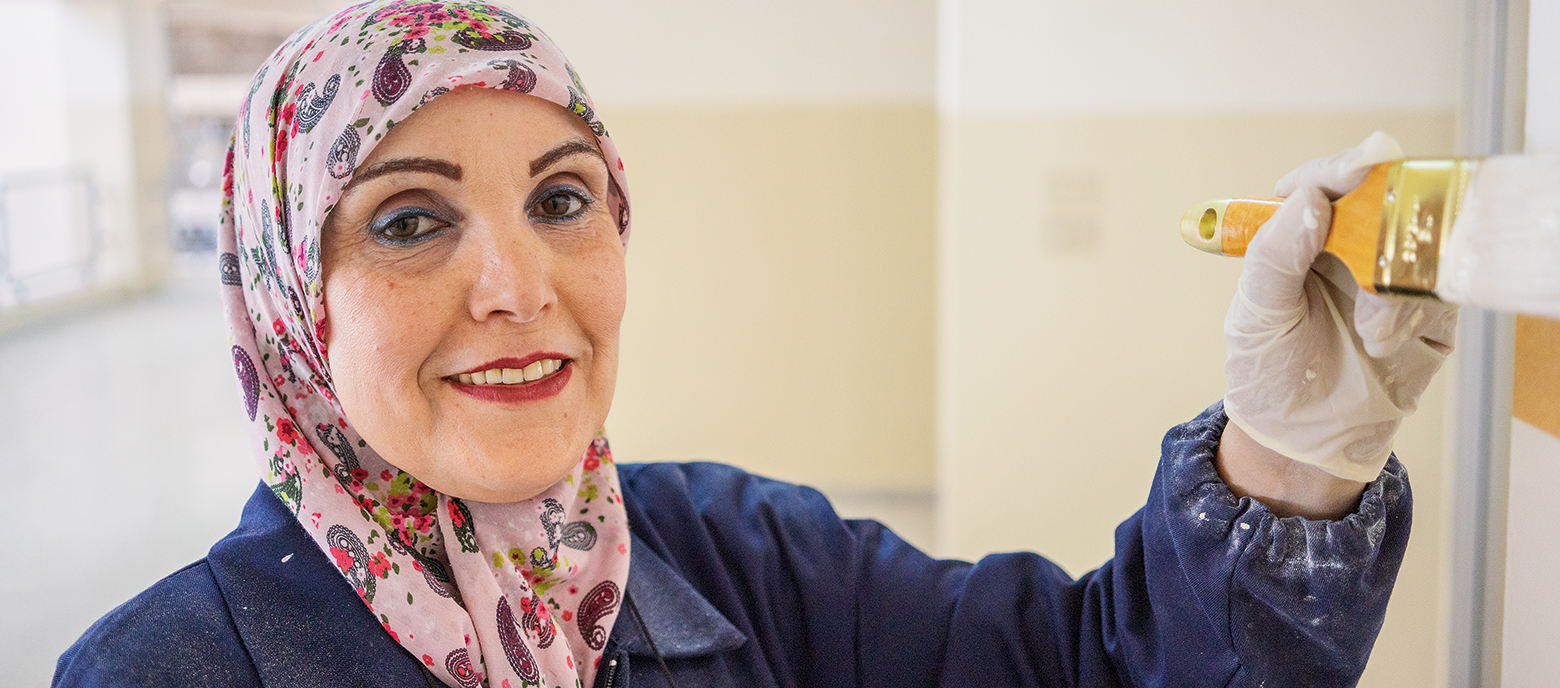Lebanon
A fresh start
‘I will use this training when I go back to Syria and look for work.’
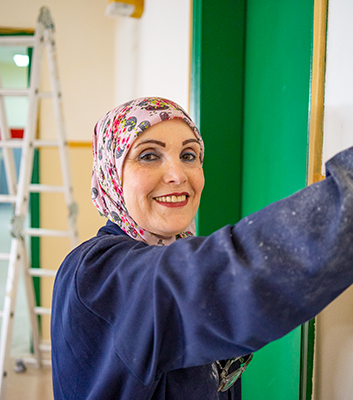
Istudied art in Syria. For me, any kind of painting is a chance to be creative. It’s not just about brushing paint onto a wall. You need an artistic touch as well as the technical know-how to mix and measure out the materials. I really enjoyed the course. I wish it lasted longer than a month. Then I could learn even more. I also make jewellery and gold leaf decorations on furniture. It’s very intricate work, but I’m used to it. I’m keen to learn about anything to do with art – especially more unusual types of work that not everyone can do. It gives me confidence and makes me proud. The training gave me valuable insights and taught me some new techniques – how to make sure you get the perfect paint consistency, for example. That was very interesting. I was determined to pass the course, and I did. I will use this training when I go back to Syria and look for work. I hope it will help me in the future. In the meantime, I keep myself busy by painting my family’s house and doing jobs for friends. Some women I know have also signed up for the training. One woman is taking the course with her husband. I encourage them all to sign up so that one day we might be able to work together as a team.’ —
‘The training has brought me a step closer to fulfilling my dream.’
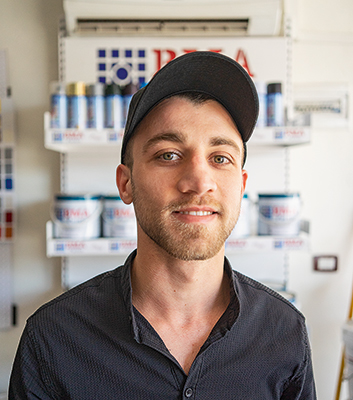
‘At first I thought I would get money when I signed up for the course. Instead, I got knowledge. That’s much better. I used to do casual jobs on building sites, but it was irregular work. Then friends told me about the course and I thought, okay, why not give it a go? For me, it really paid off for three reasons. First, you get a set of tools when you complete the course. You also get to know the trade better and can build up practical experience during the placement. The boss at my internship company showed me how to hold a brush correctly and work with different colours. I was doing it wrong before. Now, because I know how to do it right, I have more confidence in my work. During the training and then the internship, it was a great experience to be developing new skills and doing something productive with my time. I felt like I was working towards something. Since passing the course, I always take my certificate with me to interviews. When I applied for jobs in the past, companies would often close the door in my face. But now I’m hoping to find better work. I’m 23 and I’d like to start a family and rent a house, but I need to earn more. The training makes it easier to do that and has brought me a step closer to fulfilling my dream. Life is tough for many young people in my neighbourhood. Finding work gives me a good feeling, and it means I can improve my situation. I hope I can start a new life now.’ —
‘I see it as my duty to pass on skills to the next generation.’
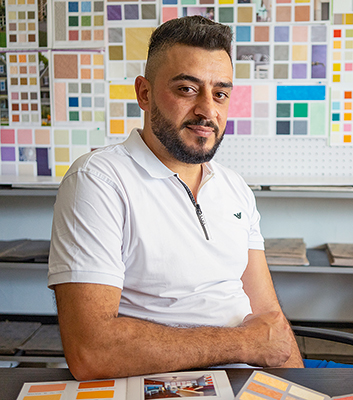
‘So far, three of the programme’s trainees have completed the practical part of their course here at my company. I continue to mentor them even after they leave. Many just didn’t have the chance to get a good education at school, so teaching them practical skills can make a huge difference. It’s only during the internship that they really understand certain things: how to use tools correctly or how to work with different materials. The practical part of the training is very important. There are so many things you can’t really learn in the classroom. You need the practical experience to learn important tricks of the trade, such as how much water you need to add to a particular product or how to separate different layers. I have almost 20 years of experience, but I still do training when a new product comes onto the market. Painting can be divided into four steps. The last, the topcoat, is the most important, because that is what the customer sees. You need a lot of patience for this work – good painting is all about quality, and I need real professionals who understand how to provide that quality. Of course, I could always find a carpenter who does a bit of painting on the side. But I need properly qualified workers who know the basics and who care about what the finished product looks like. I see it as my duty to pass on these skills to the next generation so that they can find work as professionals. If we all saw ourselves as mentors, we could work together to help the whole community move forward.’ —
‘Our accreditation system strengthens confidence in the standards.’
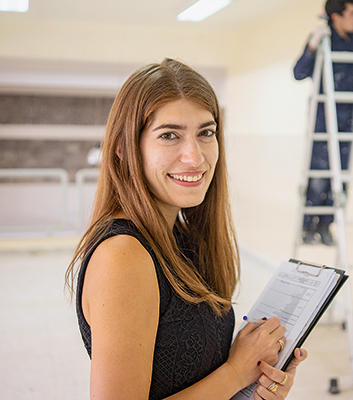
‘Everyone who joins the training programme is keen to find work, so they want to pass the exam. I’ve been struck by how committed they all are. They take it very seriously. The first thing I do is check that they have complied with the safety regulations. Are they wearing overalls and sturdy shoes? Then I check everything else on my list. Has the workplace been well prepared, for example? Have the walls been smoothed and any nails removed? It’s also important to mix the paint properly and leave the work area clean and tidy when you’ve finished. In Lebanon, it’s the safety rules that are most often ignored. It’s a cultural thing. There is a widespread view that protective clothing is unnecessary. Having said that, the situation is improving. A government decree in 2012 helped to standardise safety regulations on construction sites and raised awareness generally of the need for more stringent labour standards. If building firms can find young people who are willing and able to work to a good standard, they will hire them. That’s why I think there is a good chance that our graduates will find work on construction sites. And we hope to achieve a higher quality standard overall. Employers put their trust in our independent accreditation service. The APAVE certificate is designed to help people find work and earn more. Today, more companies than before are willing to pay a bit extra for excellent work. If they receive an application from someone with our certificate, they can be confident that he or she will meet the required standard.’ —
LEBANON
Capital: Beirut / Population: 5.8 million / GDP per capita: USD 7,690 (1) / Economic growth: 0.2 per cent (2) / Human Development Index ranking: 80 (out of 189)
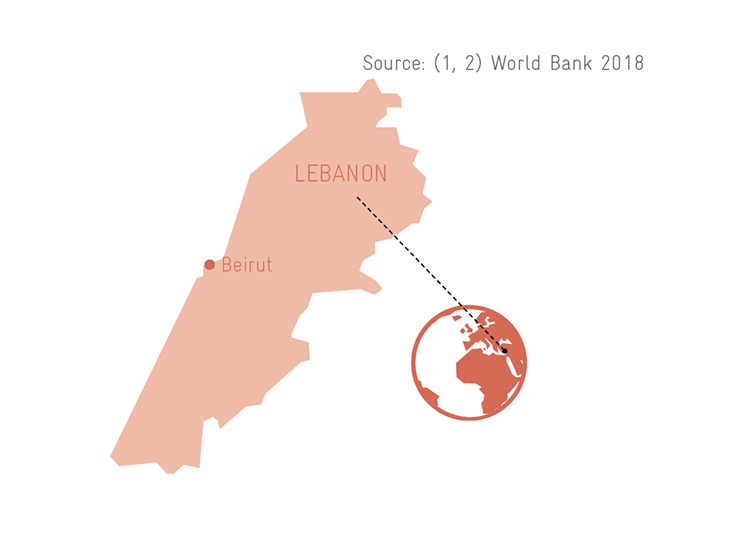
Rethinking vocational education
‘Qudra’ is Arabic for strength, resilience or ability. The Qudra programme, which GIZ is implementing on behalf of BMZ and the EU, aims to improve the living conditions of refugees and host communities. Some 1.5 million Syrians have sought refuge in Lebanon. The country is struggling with high youth unemployment. To improve the job prospects of refugees and local people, GIZ has teamed up with the Ministry of Education to offer training courses in the construction sector. To this end, in collaboration with the EU project ProVTE, it has produced a series of basic vocational training plans that are now used as models throughout the country. Previously, despite the obvious need, shorter vocational training modules were unusual in the Lebanese system. The idea is to help people gain qualifications in cases where they cannot afford the time or money to enrol on a long course. The training was also opened up to refugees. The new curriculum is modular, and courses are available all over the country. This gives young people a better chance of finding work. It also boosts the reputation of vocational training in general.
Contact: info@qudra-programme.org
![]()
published in akzente 02/19
